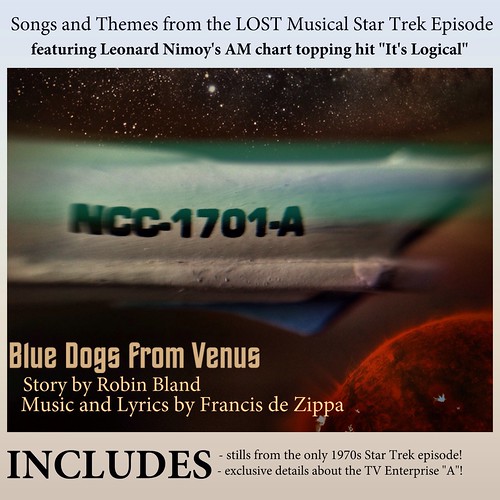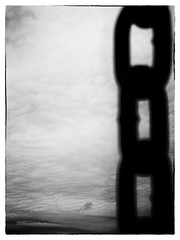Blue Dogs from Venus: Soundtrack from the Lost Star Trek Musical
Greg Herringer

The Genesis
Star Trek ended its original TV series production run in 1969, just months shy of the first manned lunar landing. In the days before VCRs, DVDs and streaming Internet video, no TV executive would have dared to revive a show with such low ratings and narrow appeal. By 1975, however, the power of late night syndicated reruns and the appeal of its counter culture themes made Star Trek a respectable topic for consideration. The problem was, how best to revive this sci-fi property?
Gene Roddenberry, the show's creator, was ready and willing to relaunch the Starship Enterprise with whatever budget and casting was available. He felt that TV was still the best medium for the Star Trek message and that most, if not all, of the original cast would be willing to sign on for at least one season of 26 episodes. What Gene needed though, was a twist, an edge, to not only encourage the original series' stars to join on but to ensure the concept was enticing to network execs. Gene's recent interest in Broadway productions and rock operas would provide the inspiration he needed...
In the Spring of 1975, Roddenberry was reviewing scripts submitted "on spec" to his office when he came across a treatment by young science fiction author Robin Bland entitled, "Blue Dogs from Venus". The plot centered on an attempt by Starfleet's Venutian-based elite Diverse Operations Group nicknamed "Blue Dogs" to commandeer the newly refitted Enterprise to rescue Blue Dog leader Captain Black's son being held hostage by Romulans in retribution for a recent covert action against the Romulan Star Empire. This troop of Blue Dogs captured the Enterprise and its crew by using an experimental weapon stolen from a Starfleet research station: a mind control field that rendered those under its influence extremely jovial, relaxed and with a strong desire to...sing.
In Bland's script, accompanied with lyrics and a roughed-in musical score by Francis de Zippa, Roddenberry found several elements that appealed to his need to sell a new idea with a frugal bottom line. Kirk, Spock, McCoy, Scotty and Uhura were all given solo songs to sing. There were several group numbers for various combinations of crew members as well as Captain Black and his team. Star Trek had featured music before in several episodes and the chance to croon on TV would certainly hook Shatner and Nimoy, who had been recording songs for some time. A music-heavy episode would also provide an opportunity to publish records featuring the performances of the lead characters, thereby giving a new source of revenue for the shows.
The action took place primarily on board the Enterprise, except for the rescue scene on the Romulan outpost, which meant that this "bottle show" script could invest in standing ship sets and not spend much on single use locations or sets. The Blue Dog team was human, which meant no money was needed for alien appliances or makeup. There was however one thing Roddenberry wanted to change...
As had been proven in the original series, shows that featured attractive female guest stars not only boosted ratings but also provided "incentive" for the show's lead character to exercise his way with the "space babes". Roddenberry purchased the rights to the script and score with the condition that he be allowed a rewrite that included a female Blue Dog leader, Captain Talia Black. If he could find the right actress for the part, Roddenberry envisioned that the character could have a recurring role in the show with spin-off potential if the ratings merited it.
By the fall of 1975, Roddenberry had inked a deal with Paramount for a 90 minute pilot featuring all the original cast members including the reluctant Leonard "I am not Spock" Nimoy who was finally swayed by the radio hit potential of his solo "It's Logical". Joining the crew as Captain Talia Black was Loni Anderson, a buxom blonde actress with a screen presence to match. As set and costume design commenced, Roddenberry worked with Bland, de Zippa and a small team of writers to refine the script with heavy doses of Star Trek panache.
View Project:




